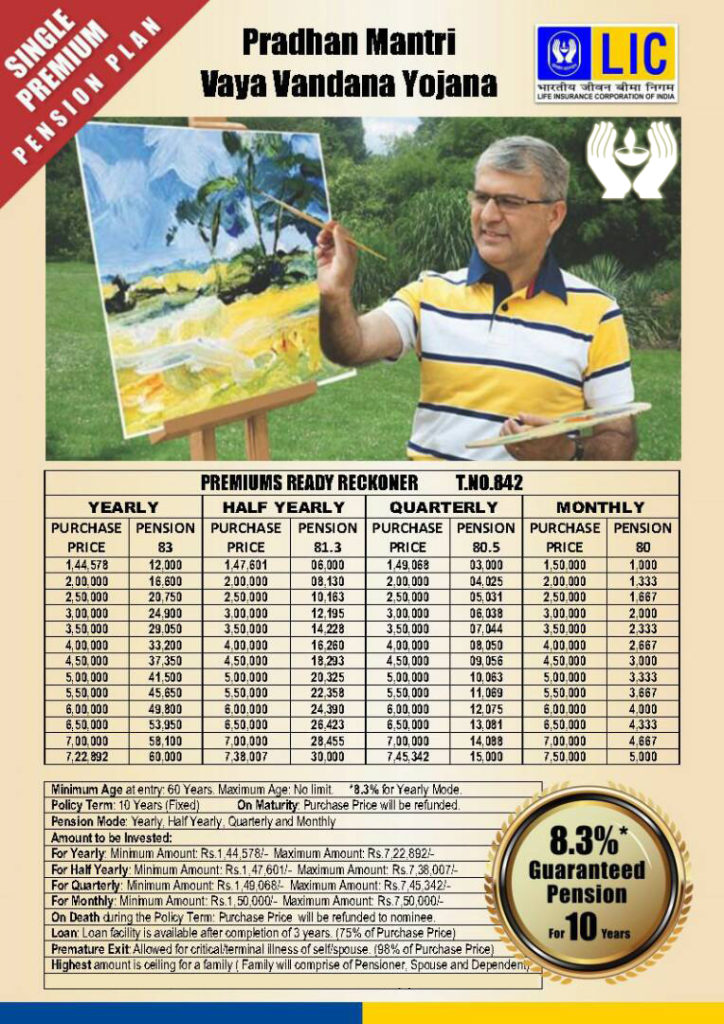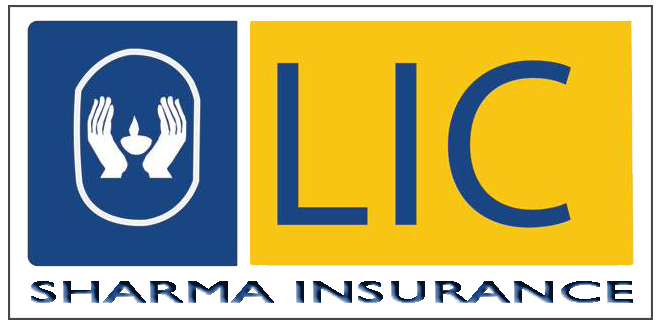Pradhan Mantri Vaya Vandana Yojana
P Pradhan Mantri Vaya Vandana Yojana ![]()
Pradhan Mantri Vaya Vandana Yojana (UIN:512G311V02)
1.Introduction: Government of India in the Budget Speech of 2018-19 has announced the enhancement of maximum limit under Pradhan Mantri Vaya VandanaYojana to Rs. 15 lakhs per senior citizen. The period of sale for this scheme has also been extended upto 31st March, 2020. LIC of India has been given the sole privilege to operate this scheme. This scheme can be purchased offline as well as online. To Purchase this scheme online please log on to our website www.licindia.in. 2.Benefits :a.Pension Payment : On survival of the Pensioner during the policy term of 10 years, pension in arrears (at the end of each period as per mode chosen) shall be payable. b.Death Benefit:On death of the Pensioner during the policy term of 10 years, the Purchase Price shall be refunded to the beneficiary. c.Maturity Benefit: On survival of the pensioner to the end of the policy term of 10 years, Purchase price along with final pension installment shall be payable. 3.Eligibility Conditions and Other Restrictions: a)Minimum Entry Age: 60 years (completed) b)Maximum Entry Age: No limit c)Policy Term : 10 years d)Minimum Pension: Rs. 1,000/- per month Rs. 3,000/- per quarter Rs.6,000/- per half-year Rs.12,000/- per year e)Maximum Pension: Rs. 10,000/-per month Rs. 30,000/-per quarter Rs. 60,000/- per half-year Rs. 1,20,000/- per year Ceiling of maximum pension is per senior citizen i.e. total amount of pension under all the policies under this plan, including policies taken under Pradhan Mantri Vaya Vandana Yojana with UIN: 512G311V01, allowed to a senior citizen shall not exceed the maximum pension limit. 4.Payment of Purchase Price: The scheme can be purchased by payment of a lump sum Purchase Price. The pensioner has an option to choose either the amount of pension or the Purchase Price. The minimum and maximum Purchase Price under different modes of pension will be as under:
2 Mode of Pension Minimum Purchase Price Maximum Purchase Price Yearly Rs. 1,44,578/- Rs. 14,45,783/- Half-yearly Rs. 1,47,601/- Rs. 14,76,015/- Quarterly Rs. 1,49,068/- Rs. 14,90,683/- Monthly Rs. 1,50,000/- Rs. 15,00,000/- The Purchase Price to be charged shall be rounded to nearest rupee. 5.Mode of pension payment: The modes of pension payment are monthly, quarterly, half-yearly & yearly. The pension payment shall be through NEFT or Aadhaar Enabled Payment System. The first instalment of pension shall be paid after 1 year, 6 months, 3 months or 1 month from the date of purchase of the same depending on the mode of pension payment i.e. yearly, half-yearly, quarterly or monthly respectively. 6.Sample Pension rates per Rs.1000/- Purchase PriceThe pension rates for Rs.1000/- Purchase Price for different modes of pension payments are as below: Yearly: Rs. 83.00 p.a. Half-yearly: Rs. 81.30 p.a. Quarterly: Rs. 80.50 p.a. Monthly: Rs. 80.00 p.a. The pension instalment shall be rounded off to the nearest rupee. These rates are age independent. 7.Surrender Value:The scheme allows premature exit during the policy term under exceptional circumstances like the Pensioner requiring money for the treatment of any critical/terminal illness of self or spouse. The Surrender Value payable in such cases shall be 98% of Purchase Price. 8.Loan:Loan facility is available after completion of 3 policy years. The maximum loan that canbe granted shall be 75% of the Purchase Price. The rate of interest to be charged for loan amount shall be determined at periodic intervals. For the loan sanctioned till 30th April, 2018, the applicable interest rate is 10% p.a. payable half-yearly for the entire term of the loan. Loan interest will be recovered from pension amount payable under the policy. The Loan interest will accrue as per the frequency of pension payment under the policy and it will be due on the due date of pension. However, the loan outstanding shall be recovered from the claim proceeds at the time of exit. 9.Taxes: Statutory Taxes, if any, imposed on this Plan by the Government of India or any other constitutional tax Authority of India shall be as per the Tax laws and the rate of tax as applicable from time to time. The amount of tax paid shall not be considered for the calculation of benefits payable under the plan.
3 10.Free Look period: If a policyholder is not satisfied with the “Terms and Conditions” of the policy, he/she may return the policy to the Corporation within 15 days (30 days if this policy is purchased online) from the date of receipt of the policy stating the reason of objections. The amount to be refunded within free look period shall be the Purchase Price deposited by the policyholder after deducting the charges for Stamp duty and pension paid, if any. 11.Exclusion:Suicide: There shall be no exclusion on count of suicide and full Purchase Price shall be payable. SECTION 45 OF THE INSURANCE ACT, 1938: The provision of Section 45 of the Insurance Act, 1938 shall be as amended from time to time. The simplified version of this provision is as under: Provisions regarding policy not being called into question in terms of Section 45 of the Insurance Act, 1938, as amended by Insurance Laws (Amendment) Act, 2015 are as follows: 1. No Policy of Life Insurance shall be called in question on any ground whatsoever after expiry of 3 yrs from a. the date of issuance of policy or b. the date of commencement of risk or c. the date of revival of policy or d. the date of rider to the policy whichever is later. 2. On the ground of fraud, a policy of Life Insurance may be called in question within 3 years from a. the date of issuance of policy or b. the date of commencement of risk or c. the date of revival of policy or d. the date of rider to the policy whichever is later. For this, the insurer should communicate in writing to the insured or legal representative or nominee or assignees of insured, as applicable, mentioning the ground and materials on which such decision is based. 3. Fraud means any of the following acts committed by insured or by his agent, with the intent to deceive the insurer or to induce the insurer to issue a life insurance policy: a. The suggestion, as a fact of that which is not true and which the insured does not believe to be true; b. The active concealment of a fact by the insured having knowledge or belief of the fact; c. Any other act fitted to deceive; and d. Any such act or omission as the law specifically declares to be fraudulent. 4. Mere silence is not fraud unless, depending on circumstances of the case, it is the duty of the insured or his agent keeping silence to speak or silence is in itself equivalent to speak.
4 5.No Insurer shall repudiate a life insurance Policy on the ground of Fraud, if the Insured / beneficiary can prove that the misstatement was true to the best of his knowledge and there was no deliberate intention to suppress the fact or that such mis-statement of or suppression of material fact are within the knowledge of the insurer. Onus of disproving is upon the policyholder, if alive, or beneficiaries. 6. Life insurance Policy can be called in question within 3 years on the ground that any statement of or suppression of a fact material to expectancy of life of the insured was incorrectly made in the proposal or other document basis which policy was issued or revived or rider issued. For this, the insurer should communicate in writing to the insured or legal representative or nominee or assignees of insured, as applicable, mentioning the ground and materials on which decision to repudiate the policy of life insurance is based. 7. In case repudiation is on ground of mis-statement and not on fraud, the premium collected on policy till the date of repudiation shall be paid to the insured or legal representative or nominee or assignees of insured, within a period of 90 days from the date of repudiation. 8. Fact shall not be considered material unless it has a direct bearing on the risk undertaken by the insurer. The onus is on insurer to show that if the insurer had been aware of the said fact, no life insurance policy would have been issued to the insured. 9. The insurer can call for proof of age at any time if he is entitled to do so and no policy shall be deemed to be called in question merely because the terms of the policy are adjusted on subsequent proof of age of life insured. So, this Section will not be applicable for questioning age or adjustment based on proof of age submitted subsequently. [Disclaimer: This is not a comprehensive list of Section 45 of the Insurance Act, 1938, as amended by Insurance Laws (Amendment) Act, 2015 and only a simplified version prepared for general information. Policy Holders are advised to refer to the Insurance Laws (Amendment) Act, 2015, for complete and accurate details. ]PROHIBITION OF REBATES SECTION 41 OF INSURANCE ACT, 1938 AS AMENDED BY INSURANCE LAW (AMENDMENT) ACT, 2015: 1)No person shall allow or offer to allow, either directly or indirectly, as an inducement to any person to take out or renew or continue an insurance in respect of any kind of risk relating to lives or property in India, any rebate of the whole or part of the commission payable or any rebate of the premium shown on the policy, nor shall any person taking out or renewing or continuing a policy accept any rebate, except such rebate as may be allowed in accordance with the published prospectuses or tables of the insurer: provided that acceptance by an insurance agent of commission in connection with a policy of life insurance taken out by himself on his own life shall not be deemed to be acceptance of a rebate of premium within the meaning of this sub-section if at the time of such acceptance the insurance agent satisfies the prescribed conditions establishing that he is a bonafide insurance agent employed by the insurer. 2)Any person making default in complying with the provisions of this section shall be liable for a penalty which may extend to ten lakh rupees.

